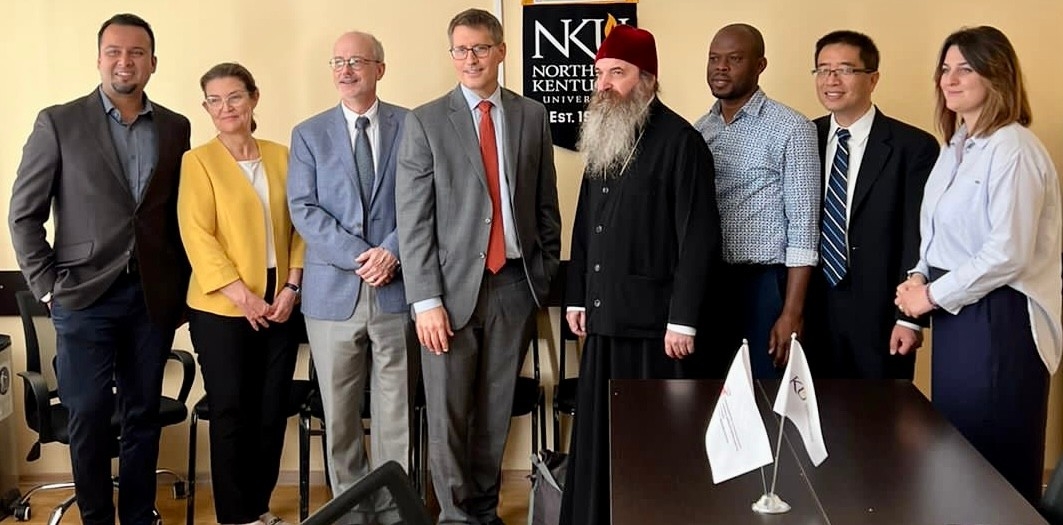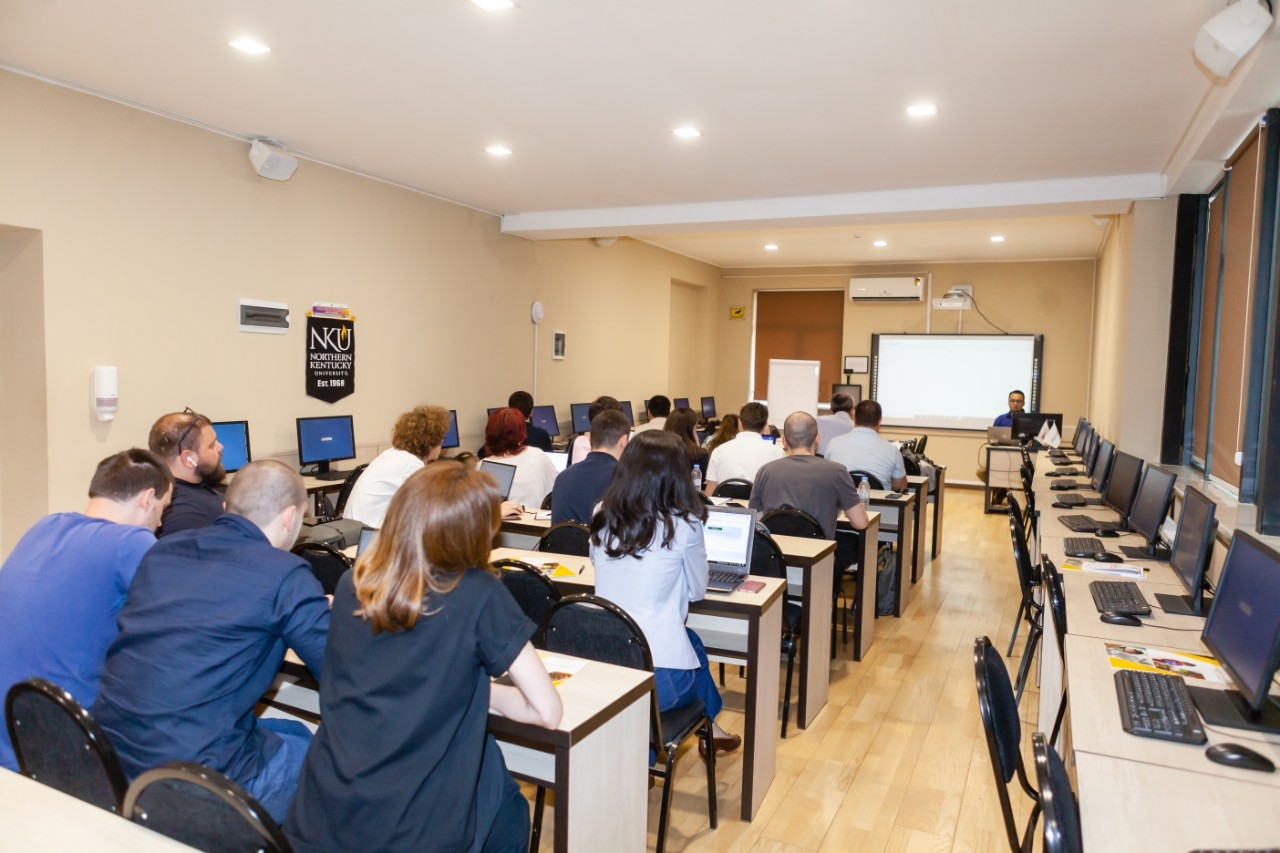
Since November 2022, Northern Kentucky University and St. Andrews Georgian University (SANGU) in Tbilisi, Georgia, have been engaged in an international partnership to award master’s degrees in cybersecurity to SANGU’s students. So far, 60 postgraduates have participated in the program, taking courses online and at both locations, with more to join in coming semesters. Though the collaboration may be a recent development, it is the result of nearly six years of planning and conversation between both NKU and SANGU—starting with a short campus tour.
SANGU, a small, private institution, was founded in 2008 by Ilia II, Patriarch of the Georgian Orthodox Church. Its campus consists of two buildings, with students living in the surrounding city.
“Our main focus is on innovation,” says Inga Nafetvaridze, SANGU’s strategic relations and communications manager. “That’s why our computer science program is very strong—the leading one in Georgia. On this basis, it was relatively easy to implement this cybersecurity partnership. We already had a foundation for it.”
“The students really liked the structure of the online portion of the program, but once they had in-person classes, the cybersecurity was beginning to make sense in a new way for them."
The first encounter between NKU and SANGU took place in 2017 as part of the U.S. Department of State’s International Visitor Leadership Program (IVLP), an ongoing exchange that connects foreign and domestic leaders in similar industries through short-term visits. Though NKU has hosted several groups through the years, the meeting with Georgia was very different from the usual brief exchange of ideas.
“I welcomed our guests from Georgia in the Student Union, and here comes this amazing gentleman: the archbishop Iakob,” Dr. François Le Roy, director of global engagement and international affairs at NKU, says. He was completely dressed up in the casual version of his bishop’s garb, standing ahead of a delegation of about six or seven people coming from SANGU. While they were here in the United States, they visited a total of 13 different universities across the country. We were just one of their stops, but there was a lot of chemistry between us.”
In an episode of NKU Magazine’s “The Norse Up Podcast” about the partnership, Informatics Dean Kevin Kirby emphasized the qualifications of the university’s cybersecurity program, which has been designated as a National Center for Academic Excellence in Information Assurance and Cyber Defense by the National Security Agency and U.S. Department of Homeland Security.
“One of the challenges about the field is that it’s changing so fast,” Kirby says. “I’m a computer scientist, and I work in AI. That’s changing fast, but it’s nothing like the pace of cybersecurity. I think they were very interested in partnering with a university that had this NSA designation to make sure that their students stay up to date in the field.”
During this initial visit, Le Roy was the only member of NKU who met with the group, speaking with the archbishop via translator. He provided a quick tour of notable campus locations, but it was Griffin Hall—home of the College of Informatics—that particularly piqued the archbishop’s interest.
“His eyes lit up as soon as I mentioned cybersecurity,” Le Roy says. “He was a mathematician and studied computer science before becoming a church leader, and he told us that he wanted the participants in the program to study cybersecurity. That was at the end of our meeting, and we kind of left it at that. I didn’t know if we’d hear from them again. But they did return in early 2019, and it was at this time that we met with the team from the College of Informatics to work out the details of the program.”
Beginning in January 2023, the exchange has given a new cohort of 30 SANGU students per semester the opportunity to complete 30 credit hours in NKU’s accelerated online cybersecurity program before completing the remainder of the program at their home university. Additionally, some of SANGU’s students will spend two to three weeks in Highland Heights this October.
“From the very beginning, there was an interest on the part of the bishop for a joint program around cybersecurity, because this responds to an essential or critical need for the country of Georgia,” Le Roy says. “Twenty percent of its national territory is under Russian occupation. There was a war back in 2008 that didn’t end well for Georgia, and they’re still bitter over it. They have a difficult history with Russia, but one thing they can do better is to protect themselves from the constant cyber attacks coming from there.”
SANGU’s student applicants were selected through a succession of competitions and interviews, resulting in a diverse pool of participants.
“They’re from both the public and private sectors, and the age range is also nice,” Nafetvaridze says. “We have recent graduates who are around 22 or 23 years old, and some are older than 50. Most of them are currently employed, usually working as cybersecurity specialists in their own companies.”
Last summer, five members of NKU’s faculty went to Tbilisi, Georgia’s capital and the home city of SANGU, for two weeks to engage with the university’s community—and the country at large.

“Dr.Kirby and Susan Brudvig, director of NKU’s business informatics program, went on national television to talk about the program and how the partnership benefits both countries,” Nafetvaridze says. “On the other hand, we were having workshops with the rest of the faculty. Every day for two weeks, the cybersecurity students took intense classes from 9 a.m. to almost 5 p.m. The students really liked the structure of the online portion of the program, but once they had in-person classes, the cybersecurity was beginning to make sense in a new way for them.”
Le Roy stresses the strategic importance of this partnership to the nation of Georgia. When SANGU representatives returned to NKU for the second time, they self-funded their trip. Ahead of this second excursion visit, he received a call from the U.S. Embassy in Georgia, describing the gravity importance of the situation and letting him know that the State Department may reach out later. Kelly Degnan, the U.S. ambassador to Georgia, even showed up to the program’s inauguration in November 2022, delivering a speech.
“The archbishop feels an affinity between our two institutions,” Le Roy says. “SANGU is relatively young like us, and they identify as innovative and fast growing. Usually in this sort of partnership, two universities sign an agreement to enroll students in each other’s programs. They pay tuition, and everybody’s happy. This is so much bigger than that.”